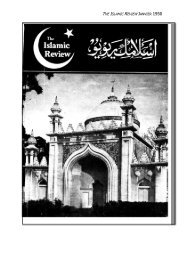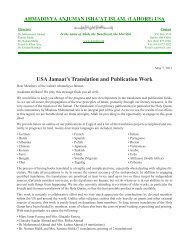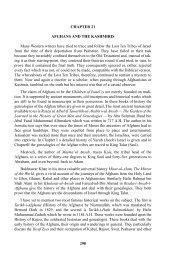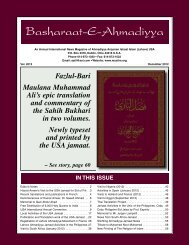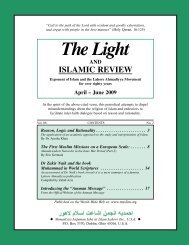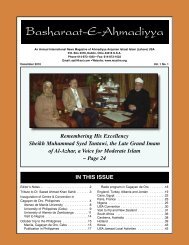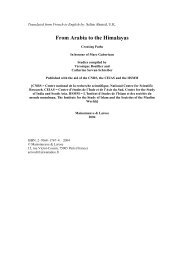Part 2] HARD TRIALS NECESSARY TO ESTABLISH TRUTH 69 152 ...
Part 2] HARD TRIALS NECESSARY TO ESTABLISH TRUTH 69 152 ...
Part 2] HARD TRIALS NECESSARY TO ESTABLISH TRUTH 69 152 ...
You also want an ePaper? Increase the reach of your titles
YUMPU automatically turns print PDFs into web optimized ePapers that Google loves.
<strong>Part</strong> 2] RETALIATION AND BEQUESTS 77<br />
and the patient in distress and<br />
affliction and in the time of conflict. g<br />
These are they who are truthful; and<br />
these are they who keep their duty.<br />
178 O you who believe, retaliation<br />
is prescribed for you in the matter of<br />
the slain: the free for the free, and the<br />
slave for the slave, and the female for<br />
the female. a But if remission is made<br />
to one by his (aggrieved) brother,<br />
prosecution (for blood-money)<br />
should be according to usage, and<br />
payment to him in a good manner. b<br />
This is an alleviation from your Lord<br />
and a mercy. Whoever exceeds the<br />
limit after this, will have a painful<br />
chastisement.<br />
179 And there is life for you in<br />
retaliation, O men of understanding,<br />
177f. The performance of promise on the part of individuals as well as of nations is<br />
one of the first essentials of the welfare of humanity, and hence the stress laid upon it by<br />
the Holy Qur’ån. Faithlessness to treaties and pledges on the part of nations has wrought<br />
the greatest havoc on humanity. Just as no society can prosper until its individual members<br />
are true to their mutual agreements and promises to each other, so humanity at large<br />
can never have peace unless the nations are true to their agreements.<br />
177g. In the concluding words of the verse, the patient ... in the time of conflict,<br />
there is a clear reference to the coming conflicts with the opponents of Islåm, ultimately<br />
leading to the triumph of Islåm over those who were bent upon extirpating it.<br />
178a. The Jewish law of retaliation is greatly modified in Islåm, being limited only<br />
to cases of murder, while among the Jews it extended to all cases of grievous hurt. The<br />
words retaliation is prescribed for you in the matter of the slain, mean that the murderer<br />
should be put to death. After promulgating that law in general terms, the Qur’ån<br />
proceeds to describe a particular case, viz. that if a free man is the murderer, he himself<br />
is to be slain; if a slave is the murderer, that slave is to be executed; if a woman<br />
murdered a man, it was she that was to be put to death. The pre-Islåmic Arabs used in<br />
certain cases to insist, when the person killed was of noble descent, upon the execution<br />
of others besides the murderer; they were not content with the execution of the slave or<br />
the woman, if one of them happened to be the murderer. The Holy Qur’ån abolished this<br />
custom (AH, Rz).<br />
178b. There may be circumstances which alleviate the guilt. In such cases the murderer<br />
may be made to pay a fine to the relatives of the murdered person. Such money is called<br />
diyat or blood-money. The reference to the alleviation of the guilt is plainly contained in<br />
the concluding words of the verse: This is an alleviation from your Lord. A comparison<br />
with 4:92 makes it clear that when homicide is not intentional, blood-money may be paid.


![Part 2] HARD TRIALS NECESSARY TO ESTABLISH TRUTH 69 152 ...](https://img.yumpu.com/11777151/9/500x640/part-2-hard-trials-necessary-to-establish-truth-69-152-.jpg)
